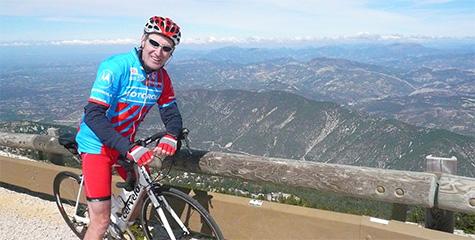 How, Glen McCarthy wondered, did I end up lying immobile on my back, staring at the four walls of a hospital room?
How, Glen McCarthy wondered, did I end up lying immobile on my back, staring at the four walls of a hospital room?
The avid cyclist - who was in prime physical condition at 56 years old - was having trouble comprehending that the night before he had been rushed by paramedics to the Nick and Rosanne Cortellucci Family Emergency at Mackenzie Health, just in time to receive the critical clot-busting drug tPA used to treat embolic or thromboticstrokes.
"I felt as if the rug had been pulled out from under me," he said reflecting back on that day in March 2016.
In 2010, at age 50, he had his first stroke shortly after having a TIA (transient ischemic attack). Having a TIA is often a warning for potentially having a stroke. He was initially left with some brain damage and loss of peripheral vision.
Despite that earlier stroke and a family history of heart disease, he still felt shocked and confused to learn he had had another.
But one thing soon became very clear in his mind: "I was determined to work as hard as I could to get back on my feet. There was no way I was going to use a cane or a walker," he said.
Following the first stroke, Glen had focused on recovering in four months so he could experience the rigorous European cycling trip he had planned for the Tour de France route.
"I said ‘Game On-. I said to whoever is pulling the strings, ‘if that-s your best shot, watch this.-"
He did, of course, take that trip, cycling two mountain passes a day.
But here he was again, despite an active and healthy lifestyle, facing another recovery from a stroke - a more serious one this time.
"I was told I was in pretty bad shape at first - my wife said I was a train wreck, slumped over in bed, unable to even sit up."
He could not walk, was numb on his left side, was having difficulty swallowing and his left arm was impaired.
He was, indeed, the first among his fellow "fallen comrades" on the Integrated Stroke Unit to begin walking again.
It-s no wonder the nurses were soon calling him "Miracle Boy".
One of the first things he did was cover those walls of his hospital room with his "adventure in France" cycling photographs to give him visual inspiration every waking moment during his 5-1/2 week stay.
"Anyone who came in the room knew this is not your typical stroke patient," he said with a grin.
He was eager to begin his rehabilitation, which was facilitated by his excellent physical condition. "Every day, I had a little milestone, they were thrilled with my progress," he said.
Glen acknowledged he has always set the bar high for himself and his therapists realized this was a man who needed to be challenged in his recovery process, which included twice-daily physiotherapy sessions.
"I-m a stubborn individual, they understood that I-m hard on myself. At rehab, I always wanted to do better. My therapist said, ‘I am going to push you to the limits-, I was jogging down the hall a week later," he added, the pride of the accomplishment still evident in his voice.
He is deeply grateful for the quality of care he received at Mackenzie Health and can-t say enough about the healthcare team members - his "biggest cheerleaders" - and the strong focus on recovery, both mental and physical.
"The dedication of those men and women is just incredible," he said, making particular mention of occupational therapist Sara Asadinik, physiotherapist Eveline Pang and therapy assistant Remy Panahi.
In gratitude for the exemplary care he received and to honour his outstanding care providers, Glen-s firm, Lab Works International Inc., made a donation to Mackenzie Health Foundation as a sponsor of its first annual Ride for Health last June.
After being discharged April 2016 and completing two weeks of rehabilitation at St. John-s Rehab/Sunnybrook Health Sciences Centre, he has returned to his King City home, where he lives with his wife, Isabel.
His daughter, Megan, 23, who lives in Australia, took a leave from her job to assist her dad in his recovery for several months. His other daughter, Lauren, 25, lives in Toronto.
"I-m blessed to have such a supportive family - they stepped up and have been with me at every step of my recovery," Glen said. "Having that kind of support and encouragement is extremely important."
On the wall above his desk at home are some of the cycling photographs that bolstered his determination in the early weeks following his stroke. A framed note and photograph of Olympic cycling medallist Steve Bauer holds a place of honour: "To Glen, I heard you are having a rough time. Be positive, keep focused on getting well. You will be back in action soon. Perhaps on the bike! Get well, Steve Bauer".
Glen continues to set and achieve milestones in his recovery. Last summer, he attended rehab sessions twice a week, spent one morning a week at his construction and engineering firm in Vaughan, was enjoying some meditation sessions, and, of course, was cycling.
Mackenzie Health is home to the York Region District Stroke Centre, providing care for those at risk of having a stroke or who require care and rehabilitation after a stroke. Mackenzie Health is the only hospital in York Region that provides the clot-busting drug tPA, administered to patients if they have signs and symptoms of stroke for less than 3.5 hours. The Centre, which is recognized with the prestigious Distinction in Stroke Services national accreditation, also provides best-practice acute care, stroke rehabilitation and stroke prevention services.
For more information, call the District Stroke Centre at (905) 883-1212 ext. 3882 or ext. 3899, or visit mackenziehealth.ca/stroke
